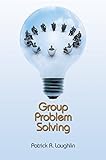Group Problem Solving / Patrick R. Laughlin.
Material type: TextPublisher: Princeton, NJ : Princeton University Press, [2011]Copyright date: ©2011Edition: Course BookDescription: 1 online resource (176 p.) : 28 line illus. 24 tablesContent type:
TextPublisher: Princeton, NJ : Princeton University Press, [2011]Copyright date: ©2011Edition: Course BookDescription: 1 online resource (176 p.) : 28 line illus. 24 tablesContent type: - 9780691147918
- 9781400836673
- Group problem solving
- Problem solving
- Small groups
- PSYCHOLOGY / Social Psychology
- IGI design
- III design
- U.S. Constitution
- algebra
- collective group response
- collective induction
- common knowledge effect
- conceptual system
- cooperative group
- cooperative groups
- cooperative problem solving
- demonstrability
- group ability composition
- group ability
- group choice
- group judgment
- group members
- group memory
- group performance
- group problem solving
- group process
- group product
- group recognition memory
- group response
- group structure
- group task
- group tasks
- group-to-individual problem-solving
- high-ability persons
- hypothesis evaluation
- hypothesis formation
- individual problem solving
- induction
- information
- intellective tasks
- intellective-judgmental continuum
- judgmental tasks
- letters-to-numbers problems
- logical reasoning
- low-ability persons
- medium-ability persons
- member characteristics
- member preferences
- problem solving
- rule induction problems
- social choice theory
- social combination models
- social combination processes
- social decision scheme
- societal decisions
- societal problem solving
- supportive group memory
- voting procedures
- voting systems
- world knowledge tasks
- 658.4036 23
- HD30.29 .L38 2017
- online - DeGruyter
- Issued also in print.
| Item type | Current library | Call number | URL | Status | Notes | Barcode | |
|---|---|---|---|---|---|---|---|
 eBook
eBook
|
Biblioteca "Angelicum" Pont. Univ. S.Tommaso d'Aquino Nuvola online | online - DeGruyter (Browse shelf(Opens below)) | Online access | Not for loan (Accesso limitato) | Accesso per gli utenti autorizzati / Access for authorized users | (dgr)9781400836673 |
Frontmatter -- Contents -- List of Figures -- List of Tables -- Acknowledgments -- Chapter One. Basic Concepts in Group Problem Solving -- Chapter Two. Social Combination Models -- Chapter Three. Memory and Group Problem Solving -- Chapter Four. Group Ability Composition on World Knowledge Problems -- Chapter Five. Collective Induction -- Chapter Six. Letters-to-Numbers Problems -- Chapter Seven. Group-to-Individual Problem-Solving Transfer -- Chapter Eight. Social Choice Theory -- Chapter Nine. Conclusions -- References -- Index
restricted access online access with authorization star
http://purl.org/coar/access_right/c_16ec
Experimental research by social and cognitive psychologists has established that cooperative groups solve a wide range of problems better than individuals. Cooperative problem solving groups of scientific researchers, auditors, financial analysts, air crash investigators, and forensic art experts are increasingly important in our complex and interdependent society. This comprehensive textbook--the first of its kind in decades--presents important theories and experimental research about group problem solving. The book focuses on tasks that have demonstrably correct solutions within mathematical, logical, scientific, or verbal systems, including algebra problems, analogies, vocabulary, and logical reasoning problems. The book explores basic concepts in group problem solving, social combination models, group memory, group ability and world knowledge tasks, rule induction problems, letters-to-numbers problems, evidence for positive group-to-individual transfer, and social choice theory. The conclusion proposes ten generalizations that are supported by the theory and research on group problem solving. Group Problem Solving is an essential resource for decision-making research in social and cognitive psychology, but also extremely relevant to multidisciplinary and multicultural problem-solving teams in organizational behavior, business administration, management, and behavioral economics.
Issued also in print.
Mode of access: Internet via World Wide Web.
In English.
Description based on online resource; title from PDF title page (publisher's Web site, viewed 29. Jul 2021)


